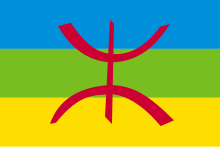
Back قومية بربرية Arabic Amaziguisme Catalan Amaziguismo Spanish بربریسم Persian Berbérisme French Nacionalismo bérber Galician Berberismo Interlingua Berberisme ID Berberismo Italian Berberisme Dutch


Berberism is a Berber ethnonationalist movement, that started mainly in Kabylia (Algeria) and Morocco during the French colonial era with the Kabyle myth and was largely driven by colonial capitalism and France's divide and conquer policy.[1] The Berberist movement originally manifested itself as anti-Arab racism, Islamophobia, and Francophilia, that was sanctioned and sponsored by French colonial authorities.[2][3][4][5][6][7][8][9][10] The movement later spread to other Berber communities in the Maghreb region of North Africa and was facilitated by colonial policies such as the Berber Dahir. The Berberist movement in Algeria and Morocco is in opposition to cultural Arabization, pan-Arabism and Islamism.[11][12]
- ^ Ennaji, Moha (2014-04-16). Multiculturalism and Democracy in North Africa: Aftermath of the Arab Spring. Routledge. p. 61. ISBN 978-1-317-81362-0.
The Berberist movement grew out of the triumph of colonial capitalism in Kabylia and the ensuing migration of Kabyle workers to France and urban centers in Algeria. Both groups of migrants coalesced traditional village and tribal allegiances into a wider regional loyalty. What also lies at the root of Berberism is the "Berber policy" of colonial France designed to "pacify" Kabylia, a region where the last major uprisings took place in 1871. French colonialists used a number of ideologies to conquer and subjugate both country and indigenous populations.
- ^ Bouherar, Salim; Ghafsi, Abderrezzaq (2022-01-03). Algerian Languages in Education: Conflicts and Reconciliation. Springer Nature. p. 25. ISBN 978-3-030-89324-8.
Ben Nouaman maintains that the Berberist movement is secular, anti-Islamic, anti-Arabic and Francophile. He details the creation and objectives of the Berberist movement and Arab reactions to its creation, practices and tendencies. The ideological conflict between Arabs and Berbers was fed by French colonisation. Nouicer, an Algerian historian, claims that the French dedicated special financing to support the teaching of Tamazight and build schools for that purpose, while restricting the use of and teaching of Arabic. Teaching was a criminal act condemned under French law.
- ^ Benrabah, Mohamed (2013-05-16). Language Conflict in Algeria: From Colonialism to Post-Independence. Multilingual Matters. p. 68. ISBN 978-1-84769-965-7.
It is true, one must point out, that. Berberism is just as acculturationist and imitative of Western (French) culture as the Arabo-Islamic nationalism which it seeks to supplant. The Berberist movement in its 'anti-Arab' and extremist expression towards an exclusive and essentialist ideology similar to the 'Arabo-Islamic' dogma of 'authenticity' endorsed by Algeria's central authorities.
- ^ Ennaji, Moha (2014-04-16). Multiculturalism and Democracy in North Africa: Aftermath of the Arab Spring. Routledge. p. 66. ISBN 978-1-317-81362-0.
The political discourse of Berberist exiles was strongly "anti-Arab" and in favor of pan-Berber and the creation of a "Berber nation." For example, Muhend Aarav (Mhand Arab) Bessaoud, a militant nationalist of Kabyle origin and an officer in the military arm of the FLN during the liberation war, wrote an anti-Arabist book published in Paris in 1966. He was a strong opponent to the regime after independence and he actively collaborated in the foundation of the Berberist movement in the 1970s.
- ^ Lazreg, Marnia (2014-04-23). The Eloquence of Silence: Algerian Women in Question. Routledge. p. 167. ISBN 978-1-134-71330-1.
The Algerian state's linguistic project was naive in comparison and fraught with problems, the most serious of which being a Berberist (which often means anti-Arab if not anti-Muslim) opposition claiming its own dialect as a national language.
- ^ Kymlicka, Will; Pföstl, Eva (2018-02-02). Minority Politics in the Middle East and North Africa: The Prospects for Transformative Change. Routledge. p. 36. ISBN 978-1-317-20550-0.
Like most modern ethnic-based identity movements, intellectuals have played a key role in articulating and disseminating the fundamental tenets of modern-day Berberism. These are mostly secular, foregrounding an ethno-linguistic identity without reference to, or even in opposition to Islam, and vocal militants often promote a crude anti-Arab position as well.
- ^ Arabia: The Islamic World Review. Islamic Press Agency. 1982. p. 18.
While these claims are legitimate and enjoy the support of all the Berber people, it is difficult to divorce them from Berberism, originally an anti-Arab and anti-Islamic francophone movement created by French colonialism in the 1920s.
- ^ Shah-Kazemi, Reza (1998-11-15). Algeria: Revolution Revisited. I. B. Tauris. p. 146. ISBN 978-1-86064-368-2.
The Berber cause should be kept outside the ideological battleground. At the moment, it is clearly being drawn into some camps which have their own ideological motivation for being anti-Muslim or anti-Arab.
- ^ Sater, James N. (2007-06-11). Civil Society and Political Change in Morocco. Routledge. p. 144. ISBN 978-1-134-12646-0.
Berber militants were charged with spreading hostile and intolerant anti-Arab and even anti-Islamic ideas (sponsored by Zionism and foreign countries).
- ^ Hefner, Robert; Hutchinson, John; Mels, Sara; Timmerman, Christiane (2013-10-23). Religions in Movement: The Local and the Global in Contemporary Faith Traditions. Routledge. p. 119. ISBN 978-1-136-68100-4.
An anti-Arab and anti-Islamic campaign was organised by these colons, formulating new representations of the Berber populations, notably of the 'good Kabyle Berber', Algeria's largest Berber-speaking population.
- ^ Willis, Michael (1997). The Islamist Challenge in Algeria: A Political History. NYU Press. p. 105. ISBN 978-0-8147-9329-9.
- ^ Almasude, Eden (2014). "Amazighité and secularism: Rethinking religious-secular divisions in the Amazigh political imagination". Decolonization: Indigeneity, Education & Society. University of Minnesota.